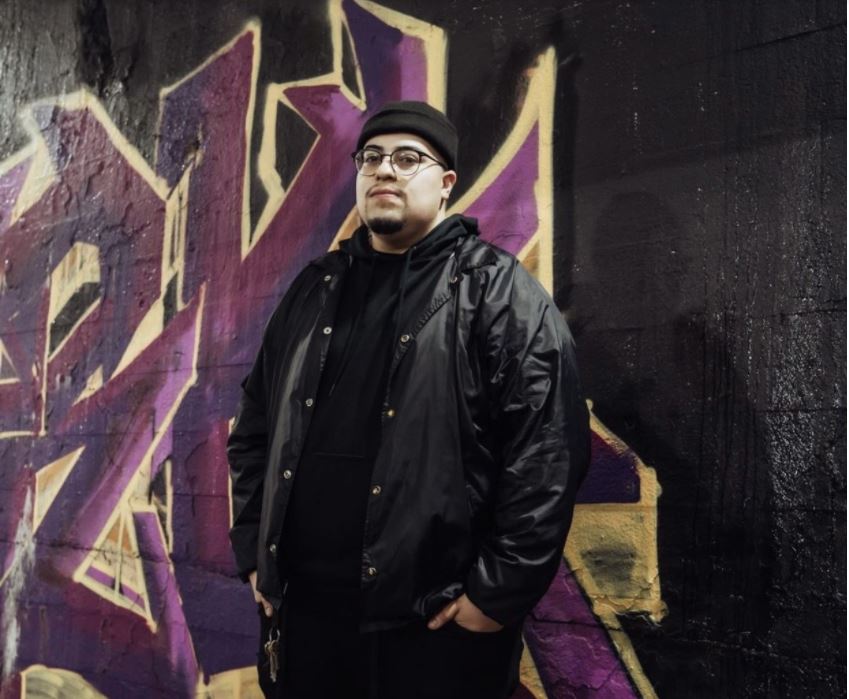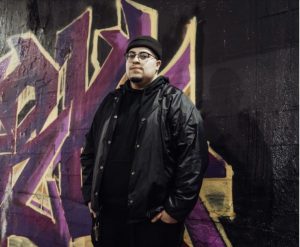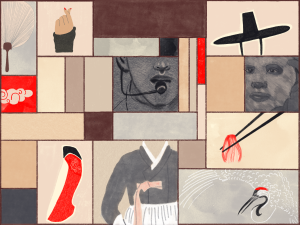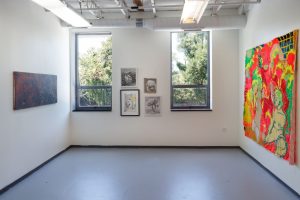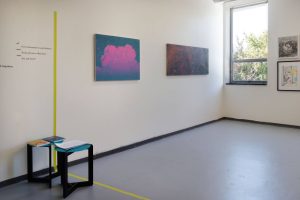Brighton Park, Back of the Yards, and McKinley Park are neighborhoods on the Southwest Side of Chicago that are bundled together so often that they are given a similar reputation and narrative by the media. It isn’t always a good one. Today these neighborhoods still face violence, poverty, and more recently, gentrification. I would like to challenge the idea that violence is the only thing these neighborhoods have to offer by shining a light on the creative minds that enrich them. In this series, “The Southwest Nest,” I hope to celebrate and recognize these artists and share with you their perspectives of the neighborhoods they either work in or call home.
This interview covers the span of a year. For Part 1 of this interview, which took place in October of 2019, I met up with artist CeaseDays (Cesar Diaz) at Simone’s, one of the many places where he performs and DJs. CeaseDays may sound like a familiar name if you went to UIC. As a student he ran the radio show, “Thumpin’ Thursdays.” You can also find him contributing to the Pilsen nightlife and music scene. In this interview, CeaseDays tells us about his career and his life living in the Southwest neighborhood, Brighton Park, where he has spent most of his life. It was truly a privilege to have lunch and interview with him. Part 2 of this interview was conducted in October of 2020 via email.
Click for: English | Español
Part 1
Angelica Flores: Thank you for meeting up with me! I know that you’re a DJ and you also do event management but you’re also an artist manager and an on-air person. It’s really exciting that you do a lot, what out of all those things do you enjoy the most or which one do you do more often? Which are probably two different questions actually but how do you manage to balance everything?
CeaseDays: So for me, it’s something that I enjoy doing. It wasn’t immediate, it was something that I kinda grew into. I love DJing, it’s literally a job for me, it’s a job that I love. Everything else kinda got figured out alongside the way. The event management thing is pretty new. It’s been about, I wanna say three-four years since I was in college. The radio thing happened about six years ago, honestly, it all goes hand in hand. It all partakes into one another. The event management goes into DJing. Some events in certain places were not going like I expected them to and I said I could do a better job and sure enough, the opportunity came about and it worked. Now I’m starting to like that more than the aspect of DJing itself which is weird to me. It’s something that I love, it provides food on the table for my family and still pays the bills and at the end of the day, I go home happy. It’s just like a normal job, you know how people say, how do you work 50- 60 hours a week? You know when you love it, there’s no time limit for it, I would spend a thousand hours of the day if I had the time for it. It’s just all about balance so now that I’m out of school, it’s easier to balance than when I was in school. But that’s how I learned how to do everything, time management, money management, marketing, putting everything together was all from college, from the radio.
AF: What was the radio show that you worked for?
CD: I was with the UIC radio for 6 years. I started working with them when I was ending as a high school senior. I was sending in mixes and when I went in there freshman year, they offered me to run a 2-hour program show on Thursdays and they said “literally you can do whatever you want as long as it’s clean, bring whoever you want, do whatever you want” and I’m like “alright cool, I’m just gonna DJ for two hours and make myself known and I started bringing my friends in and we would mess around in the radio show and make jokes on the air and it just started out that way and they started saying, you should bring certain DJs we look up to like here in Pilsen, the Ghetto Division guy, Chicago Deadbeat, different DJ crews that we looked up to at the time. From there, it just went bigger, bigger and bigger, then we got to Four Genius who at the time was on Kiss FM and he recommended a lot more people and before we knew it, we had Rick Ross in the studio, Chance the Rapper’s brother, you know, big people. Six years later, it’s time for me to move on. I graduated from UIC with a bachelor’s degree and I didn’t feel like it was still a fit for me so I ended up leaving. The radio show was called “Thumpin’ Thursdays” and it was on UIC radio. I started off at 2 hours then it went to 3, then 4, then 5, but then eventually it got cut down back to 2. The brand of itself got so big that the place we’re sitting in today, Simone’s, offered us to have an open mic event for local artists to express themselves here and we do that once a month here.
AF: It sounds like you did a lot during undergrad, I completely understand because I did a lot too.
CD: Yeah, everybody has their own path, not everyone is going to go into media, some people do, like you said, creative writing, some people go into acting, some are comedians. As long as you like it, it really doesn’t matter what it is.
AF: Yeah, for sure. So when you go to an event, or do you call it gig, what is the official term for it? (laughs)
CD: I think the term for it is gig but I just say, we would usually say what we have, like, “I have Simone’s” we just say the location.
AF: Got it, so whenever you go to a location do you already have a set of songs or remixes that you know you want to play or is it something you do at the spot? Do you find that a pivotal part of your art when you do that?
CD: So obviously there’s different types of DJs, there’s people that have playlists already when you DJ a wedding, usually there would be a playlist already set or something like that but I don’t do that stuff (laughs). I create my own lineups, I make the flyers, we create the vibe, we create the theme and everything, and when I say we, I mean DSVLDS, which is the crew/ social club that I’m a part of. So, that’s what we do. We give them the element of, “You know you’re gonna have a good time, you’re gonna vibe with us but you don’t know if your favorite song is gonna be played” and that’s how we create the vibe. At the end of the night, when everybody is all drunk and they’re all dancing with their boo or whatever, I’m not gonna play the hottest reggaeton song, I’m probably going to play, depending on the vibe and the location, I’ll probably hit them with the R&B, with the Aliyah, something that will make them slow down and go home safely. That’s just one of those things, I never have a playlist but I also play what I want. Also, I’m aware of what people want to hear, I’m not just gonna be an asshole and do whatever I want, I’m not like that. There’s no playlist but I always go prepared with what I wanna do kinda in a sense, just not exactly with songs. Just like anything else, there’s a time and place, like I’m not gonna come, for example to the open mic, I’m not gonna play juke all of a sudden, it’s a Hip-Hop vibe its an R&B vibe, if I have a big hip hop artist then I’ll play Biggie, you know, time and place. That’s something that took awhile for me to understand but now that I understand it, it works in my favor. Then there’s also a lot of local artists that we support the music from. Just today, our boy, Baby J, came out with a two-song project and we have big plans for that to play it everywhere so when we get a chance we throw those in if it fits if not, it’s not really planned.
AF: It’s not “I’m only gonna play these songs or something like that” (laughs)
CD: Yeah, not at all. It’s literally a mix of how I’m feeling, what I’m interpreting from the people, from the vibe and the place, and you know as long as it follows the rules of the establishment. For some events prefer only clean music, on the radio, literally it was only clean music but that’s the radio, it’s a little bit different but yeah, I never have a set playlist at all unless it’s something that needs to be done.
AF: how do you figure out the vibe? I know it’s probably the theme…
CD: Yeah, it’s really hard to describe.
AF: Do you like observing people?
CD: Yeah that’s what I do.
AF: I love doing that too, that’s funny because that also helps me with my writing so it’s interesting that other artists do that as well with their own art, I never thought of it that way.
CD: I was never really a social guy, that’s how I started DJing, I went to house parties when I was a kid and I wasn’t talking to anybody I was just next to the DJ looking at people.
AF: I’m the one next to the dog. (laughs)
CD: Yeah! (laughs) Now it’s a little bit different, now people can’t get me to stop talking, that’s something I’ve learned from the radio stuff.
AF: So that leaves me to ask, what kind of genres do you mix, or rather what are your favorite genres? If anything.
CD: So it depends on the event right and in most cases we would already know and that’s kinda where it gets a little bit weird because if we go into an establishment already planned, what the theme would be, what the flyer is, what the event name is, people kinda have an idea and we’re trying to get that into their brains like, “this is what’s going to be played” I have a rotating party called “Muevelo” and it’s literally dedicated to Latin and Urban vibes, so it’s a lot of dembow, reggaeton, sometimes cumbia, it really is depending, anything Latin.
AF: So that’s your favorite genre to play?
CD: No, it really does depend, I really don’t have a favorite one, it really does depend on how I’m feeling or where I’m at. I hate that question so much, I’m sorry, I’m just saying in general because I listen to everything. I really love hip hop, the old and the new stuff but I also love house music. I do House of Sol with Fiesta del Sol, I love house music and techno, ghetto house, juke, all that stuff, but I also love the new reggaeton. Sometimes I’ll do rock, alternative, it depends.
AF: I love rock. I’m still stuck in 2005 reggaeton with Daddy Yankee.
CD: I don’t blame you, that was a good time.
AF: It was!
CD: We had no business singing what he was talking about but yeah.
AF: So how does being a DJ differ from all your other art forms or what do you think makes it unique in comparison to all the other things you do? I feel like I’m just reiterating this question again but I just wanna know what your perspective is.
CD: I’ve been doing that one the longest and it’s the one I feel the most comfortable with but it’s taught me a lot. I don’t know how that makes any sense, in my mind it still doesn’t make any sense but DJing has taught me a lot of lessons, life skills. It really did teach me how to be an adult. I started DJing when I was 14, I’m 24 now. I know it’s been literally a lot of my life almost half of my life at this point. Everything else has fallen into place. Ten years is a long time (chuckles).
AF: So you answered, how did you first get involved in music? You answered it so…
CD: No, actually that’s a different story.
AF: Oh okay, I wanna hear that then!
CD: I honestly don’t know the very beginning of it but when I was a kid, I remember we had a drum set that I sucked terribly at. I was playing clarinet as a kid and then from there I went to playing the piano, I had an electronic keyboard and I really wanted to learn songs but I didn’t want to just watch and do it. So I sat down and taught myself how to read music and from there on I went to playing guitar, electric guitar, in high school I played a lot of different instruments in band. Orchestra, symphonic, everything. I just wanted to learn as much as I could and I started beginning into music production and then from there on DJing. I didn’t really take it seriously until I was in high school. Learning how to read music and in a music library we see it as cues and we can organize it as musical cues and how they sound and when you get to make songs that way, it sounds so much better. So I’ve always been into music but now I’m kinda glad I learned the basics cuz now I understand sound. Instead of how normal people hear it, I hear it with a different ear and it kinda goes hand in hand into what I’m doing now, managing artists, working with artists in the studio, if I hear something’s wrong or somebody’s vocals isn’t hitting the note or the song on the right key, I fix that. We work together, again, I’m kinda glad that I’ve learned the basics but I’ve always been doing music for a long time.
AF: What high school did you go to?
CD: I actually went to Muchin College Prep, a charter school downtown, you heard of it?
AF: Yeah! I work downtown so I see students with their uniforms.
CD: I think they cut the music program but it was good while it lasted.
AF: Aww, that sucks. So this is where I wanted to start to shift topics to talking about Brighton Park, so the neighborhood you grew up in, the neighborhood I grew up in. So what are your thoughts and is there anything you wish you knew about it?
CD: Yeah, so I went to Shields for elementary school and then I went to McKinley Park after 4th grade and McKinley was one of the best schools that I could have went to. I’m still really good friends with a lot of people that I met there even though we were not in the same class or the same grade, 15 years is a long time to be friends with someone. You know, that’s a blessing for me, especially in Brighton Park. It’s a lot of gang members, people don’t live to graduate high school. It’s one of those communities where people just overlook just because it’s in the middle of Midway and Pilsen, so it’s not a big name community or something. There’s also not a lot of tools or resources for the people there, a lot of people are poor or in the middle class. Like I said, it’s often overlooked. People don’t have educational opportunities like everybody else. I’m proud of being from there but it can always get better. This is why I volunteer in the community, try and do the best that I can because somebody’s gotta do it, right? I’ve been there all my life.
AF: So you were talking about House of Sol earlier, and I did notice on your website that you’re the organizer of it, and that belongs to Fiesta del Sol. Are there any projects that you’re working on at Brighton Park that are similar to that or would you like to have something in Brighton Park similar to that?
CD: I just graduated from UIC in May, but an end goal, not really an end goal, but something down the line that I wanna do is create a nonprofit that has to do with management, music, and youth or anybody from underprivileged communities. I’ve been working in Pilsen for a few years, I did some work in Humboldt Park but I do wanna do something that helps Brighton Park and McKinley Park. You know, there’s not a lot of things for people to get help in, to reach out to, and I’d like to be one of those people. Like I said, I’ve been there all my life to this day so it’s just one of those things that got my feet wet, got me to experience how it is running these things and of course thanks to the team that helps me run that. It’s just one small part of what I really wanna do but yeah of course down the line for sure. There’s a lot of broken things in Brighton Park that need a lot of help in especially in the political world so that’s why I definitely want to dive in.
AF: That was actually my next and last question, in 20 years, where do you want to be in your life and career? And I know that’s something that people want to think and take a second.
CD: Yeah so in 20 years, I definitely wanna be done with a master’s degree, having a successful nonprofit organization or some sort of organization that helps people of color in Brighton Park, McKinley Park, or any neighborhood in the South Side including Pilsen. That’s just part of it. With a family for sure, just being successful and happy, that’s always been my thing, is to always be happy despite everything else. You don’t need a lot of money to be happy, just need to have people around who care for you and do what you wanna do. The goal is to be happy. I’ll do whatever it takes to get there. 20 years, that’s a long time, that’s a long time from now. I’ll be 44. ( laughs) Having traveled the world, I wanna travel a lot. I literally have 30 different places around the world I want to travel to and I wanna get that done.
AF: I know 20 is a lot but I ask that because one of my goals after 20 years is to see where everyone who I have interviewed is in their life so if Sixty inches keeps on growing, then I would like to see that. But yeah, those are all the questions, thank you so much!
Part 2
AF: I know our interview was back in early October, but I’m curious to know how art (or your art) has been helping you during these times and is there anything else you would like to share with the audience?
CD: From July to August, I was restoring and rehabilitating neighborhoods and local businesses who were affected by looting; specifically in the South/South East Side of Chicago. Neighborhoods like South Shore & Calumet Heights that are often forgotten about. These projects consisted of building and beautifying art/community centers for the youth. It was a really great thing to do for people that have no outlet or opportunities to express themselves. Specifically, I also helped paint a beautiful mural and playground for the “True To Life Foundation Arts & Community Center” located at 8824 S. Stony Island. This was through the Free Lunch Academy, one of the best non-profit organizations I’ve ever come across. It was a beautiful cross between my love for art and helping the people of this city. It’s amazing to see that different forms of art can create a more positive attitude and exercise good moral character. I strongly suggest readers and friends to look into the Free Lunch Academy.
AF: Are there any updates with your work that you would like to share/ promote?
CD: I have been slowing down a bit with the music because of the current pandemic. I’ve been working more on improving my understanding of the financial and business side of it. More specifically, I want to place not only myself, but the people around me (and others in the industry), in a better position to invest in their future. COVID has forced us to think outside the box for the industry, finding loopholes and still succeed in this business (or any business really). It’s a good thing to always keep in mind, because we can’t DJ, or rap, or actively do music day-in/day-out until we’re 86 years old. It’s not realistic, and thinking about the future is always a step in the right direction. So is having something else to rely on. During quarantine I created a record label (with my buddy Francisco ‘Syko’ Hernandez) for music producers to experiment and release their music however they’d like. The marketing, planning, release date, guest features, and just about every aspect of a release is in the hands of the artist. We have the table and the tools, and we offer guidance on them developing these projects. This is a hard and cutthroat industry, but there are plenty of hard working producers and artists that are overlooked, or have no contact with bigger labels, events and artists. So what we’re doing is assisting in crossing that bridge.
For anyone reading, PLEASE take care of yourselves, your family, and the close people around you. Get tested often, and encourage others to do the same. Keep learning, and keep a positive attitude for everything.
I’ve deleted myself from social media for the time being, but everything can usually be found on my site: www.CeaseDays.com.
Featured Image: CeaseDays is wearing a black beanie, a black windbreaker with a black hoodie underneath, and black jeans. He has his hands tucked in his jean pockets. He is standing in front of a graffiti mural with a black background and purple and yellow letters. Image courtesy of the artist.


Angelica Flores is a Mexican-American writer and Dominican University graduate. She enjoys working on English-Spanish translations and writes for The Gate Newspaper where she has reviewed books, films, and theater performances. She works for the Poetry Foundation and is the owner of the blog, The Macaron Raccoon.
